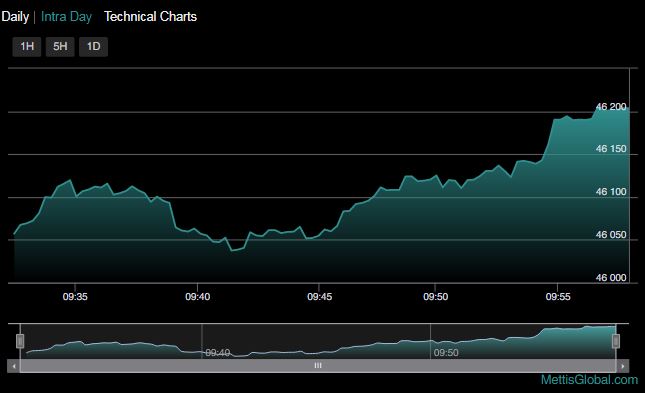UN warns of ‘massive’ global impact of US tariff hike in China trade battle

MG News | February 05, 2019 at 03:15 PM GMT+05:00
UNITED NATIONS, Feb 05: A United Nations expert has warned that a US plan to raise tariffs on Chinese goods next month would have "massive" implications for the global economy unless it is resolved.
US President Donald Trump has placed tariffs on nearly half of all goods that are imported from China as he tries to force Beijing to change what he claims are unfair trade practices, including the forced sharing of technology.
Unless the US and Chinese agree to drop their tariff dispute by 1 March, duty on each country’s products will rise to 25 per cent, up from the current 10 per cent level.
Of the $250 billion in Chinese exports that are subject to US tariffs, only about six per cent will be picked up by firms in the United States, according to a report by the UN Conference on Trade and Development (UNCTAD).
And of the approximately $85 billion in US exports that are subject to China’s tariffs, only about five per cent of this will be taken up by Chinese firms, the UN research shows.
The report said Asian countries are likely to suffer most from protectionism.
The implications are going to be massive," Pamela Coke-Hamilton, UNCTAD's head of international trade, said at a news conference in Geneva on Monday.
"The implications for the entire international trading system will be significantly negative."
Smaller and poorer countries would struggle to cope with the external shocks, she said.
UNCTAD's report estimates that east Asian producers will be hit the hardest, with a projected $160 billion contraction in the region's exports. But it warns the effects could be felt everywhere.
"There'll be currency wars and devaluation, stagflation leading to job losses and higher unemployment and more importantly, the possibility of a contagion effect, or what we call a reactionary effect, leading to a cascade of other trade distortionary measures," Ms Coke-Hamilton said.
The report also cautions that the effects “are consistent across different sectors” including machinery, furniture, chemicals and precision instruments, noting that bilateral tariffs “would do little to help protect domestic firms in their respective markets”.
Quoting former US Secretary of State Cordell Hull, UNCTAD’s Pamela Coke-Hamilton repeated his description of protective tariffs as “a gun that recoils on ourselves”, which had also contributed to the Great Depression of the 1930s and the rise of extremism.
“I think that is a single lesson from what we have had here today,” Ms. Coke Hamilton said. “If - barring an agreement between US China on 1 March - tariffs will escalate to 25 per cent, which is a significant difference from the 10 per cent as it currently exists.”
The implications of such a development would be “massive”, the UNCTAD Director, Division on International Trade in Goods and Services, and Commodities, continued, adding that its effects would first of all involve “an economic downturn due to instability in commodities and financial markets”.
Next, Ms. Coke-Hamilton said, there would be “increased pressure on global growth, as companies will have to impose adjustment costs which will affect productivity investment and profitability”.
Countries that are expected to benefit the most from the trade warare European Union members; the UN study indicates that exports in the bloc are likely to grow by $70 billion. Japan and Canada, meanwhile, will see exports increase by more than $20 billion each.
Although these figures do not represent a large slice of global trade – which was worth $17 trillion in 2017 – for some countries, like Mexico, the increase in exports will amount to a six per cent rise in exports overall.
Other countries set to benefit from the trade tensions – which erupted in early 2018, when China and the US imposed tariffs worth around $50 billion on each other’s goods – include Australia, with 4.6 per cent export gains, Brazil (3.8) India (3.5), Philippines (3.2) and Viet Nam (5).
But the UNCTAD study also warns that the spat could hit East Asian producers the hardest, with a projected $160 billion contraction in the region’s exports unless discussions between China and the US are resolved before the March deadline.
The study also underlines the “common concern” that trade disputes have an unavoidable impact on the “still fragile” global economy, particularly on developing, commodity-rich countries that are dependent on exports.
“One major concern is the risk that trade tensions could spiral into currency wars, making dollar-denominated debt more difficult to service,” the report adds.
(APP)
Related News
| Name | Price/Vol | %Chg/NChg |
|---|---|---|
| KSE100 | 138,412.25 167.63M | 0.32% 447.43 |
| ALLSHR | 85,702.96 423.28M | 0.15% 131.52 |
| KSE30 | 42,254.84 82.03M | 0.43% 180.24 |
| KMI30 | 194,109.59 84.31M | 0.15% 281.36 |
| KMIALLSHR | 56,713.67 216.77M | 0.03% 16.37 |
| BKTi | 37,831.34 13.04M | 1.62% 603.62 |
| OGTi | 27,440.63 3.93M | -0.09% -23.70 |
| Symbol | Bid/Ask | High/Low |
|---|
| Name | Last | High/Low | Chg/%Chg |
|---|---|---|---|
| BITCOIN FUTURES | 119,195.00 | 119,440.00 118,260.00 | 900.00 0.76% |
| BRENT CRUDE | 71.88 | 73.17 71.85 | -0.63 -0.87% |
| RICHARDS BAY COAL MONTHLY | 96.50 | 0.00 0.00 | 2.20 2.33% |
| ROTTERDAM COAL MONTHLY | 104.50 | 104.50 104.50 | -0.30 -0.29% |
| USD RBD PALM OLEIN | 998.50 | 998.50 998.50 | 0.00 0.00% |
| CRUDE OIL - WTI | 68.61 | 69.79 68.57 | -0.60 -0.87% |
| SUGAR #11 WORLD | 16.47 | 16.58 16.44 | -0.12 -0.72% |
Chart of the Day
Latest News
Top 5 things to watch in this week
Pakistan Stock Movers
| Name | Last | Chg/%Chg |
|---|
| Name | Last | Chg/%Chg |
|---|



